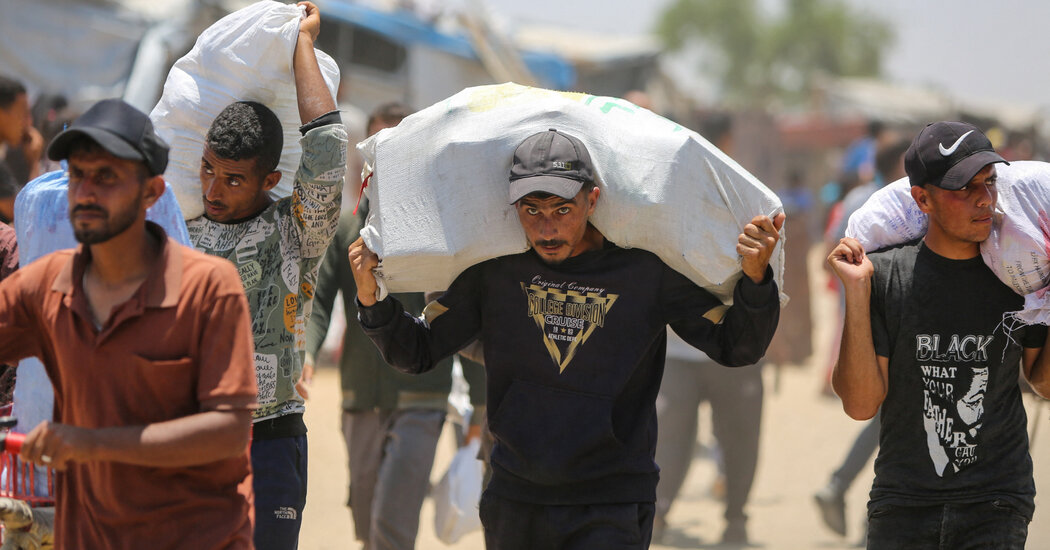The distribution centers of the much-criticized new aid system for Gaza were mired in new chaos on Monday, amid accusations and denials that Hamas had threatened over the weekend to attack workers for the Israeli-backed group handing out food supplies.
The Gaza Humanitarian Foundation, which was set up to bypass the traditional aid distribution system run by the United Nations, said on Saturday that some of its workers had been threatened by Hamas, the militant group that led the attack on Israel on Oct. 7, 2023, and controls the Gaza Strip.
On Monday, Hamas denied the accusations and accused the aid group of lacking neutrality.
Shootings near aid distribution centers have killed dozens of people and wounded hundreds since the foundation began operations at the end of May. The Israeli military has acknowledged firing near people who had deviated from “designated access routes” and who did not respond to verbal warnings. Gaza health officials say dozens of Palestinians have been killed trying to get aid.
Shots were again fired about half a mile from one of the distribution sites early Sunday. Gaza’s health ministry said five people were killed and 123 were wounded in the incident. An Israeli military spokesman said the army had fired warning shots at people who were “advancing in a way that endangered the troops.” It added that some people had been injured, but did not specify how many.
Many Gazans interviewed by The New York Times have said they head to the sites early, despite repeated warnings from the Israeli military that it regards the areas as active conflict zones when the centers are not open. Many are desperate for food — Gaza faces a severe hunger crisis — and seeking to get ahead of large crowds.
Israel’s war against Hamas in Gaza has razed huge urban areas and forced almost all the enclave’s two million residents to flee their homes at least once. Israel cut off deliveries of food, fuel and other essential goods to Gaza in March as a way to pressure Hamas, a blockade that ended in mid-May after almost 80 days. Aid groups and some Israeli military officers have warned that the restrictions have pushed Gazans to the brink of starvation.
Israel has accused Hamas of diverting aid from humanitarian groups under the previous distribution system, which was managed by the United Nations across hundreds of distribution sites. The United Nations has said there was no evidence that the militants systematically diverted aid.
Israel agreed to allow some aid into Gaza last month. Most has come through the foundation, which has four distribution sites that are operated by private American security contractors in coordination with the Israeli military. The United Nations and other aid groups have boycotted this system, and have accused Israel of using aid as a part of its military strategy.
On Saturday, the foundation said it was “impossible to proceed” with aid distribution because Hamas had threatened its staff. A group spokesman later shared a written warning he said local staff members received, threatening them with “serious consequences” if they continued working for the program. The Times was not able to independently verify the claims.
In its response on Monday, Hamas said the foundation “continues to spread canned lies” and called it “nothing more than a propaganda front for the Israeli occupation army.”
Yet even beyond the dispute over security threats and attacks on civilians, the foundation’s unpredictable distribution system continues to confuse and frustrate Gazans.
After announcing the opening of one center on Monday on its Facebook page, the foundation posted less than 20 minutes later that distributions were completed and it had closed. The comment section filled with angry reactions to the short notice and opening period.
A second post said that the foundation had closed another center “because of the chaos of surrounding crowds, which prevented the safe delivery of aid.”
The foundation then closed comments on its posts.
The aid group later said that it would open a center on Monday evening.
Since its launch, the foundation has also been rocked by internal turmoil. Its executive director resigned hours before operations were set to begin. Last week, the U.S. advisory firm Boston Consulting Group said it had halted involvement with the aid organization.
The firm said in a statement on Saturday that a team of its employees from the United States had “provided pro bono support” to set up an aid organization in Gaza to work alongside other relief efforts but said they had “failed to disclose the full nature of the work.”
The company said it regretted the situation, and that the two managing directors and partners who led the efforts had “exited from the firm.”
International aid groups warn that Gazans remain at serious risk of malnutrition. The distribution sites remain hard to reach for many Gazans, particularly those in the north.
The U.N. Food and Agriculture Organization said on Monday that the average Gazan was getting only about two-thirds of the necessary daily caloric intake. It added that continuing to impede aid flows could be classified as a war crime.
Rawan Sheikh Ahmad and Adam Rasgon contributed reporting
The post Group Accuses Hamas of Threatening Aid Workers in Gaza appeared first on New York Times.




